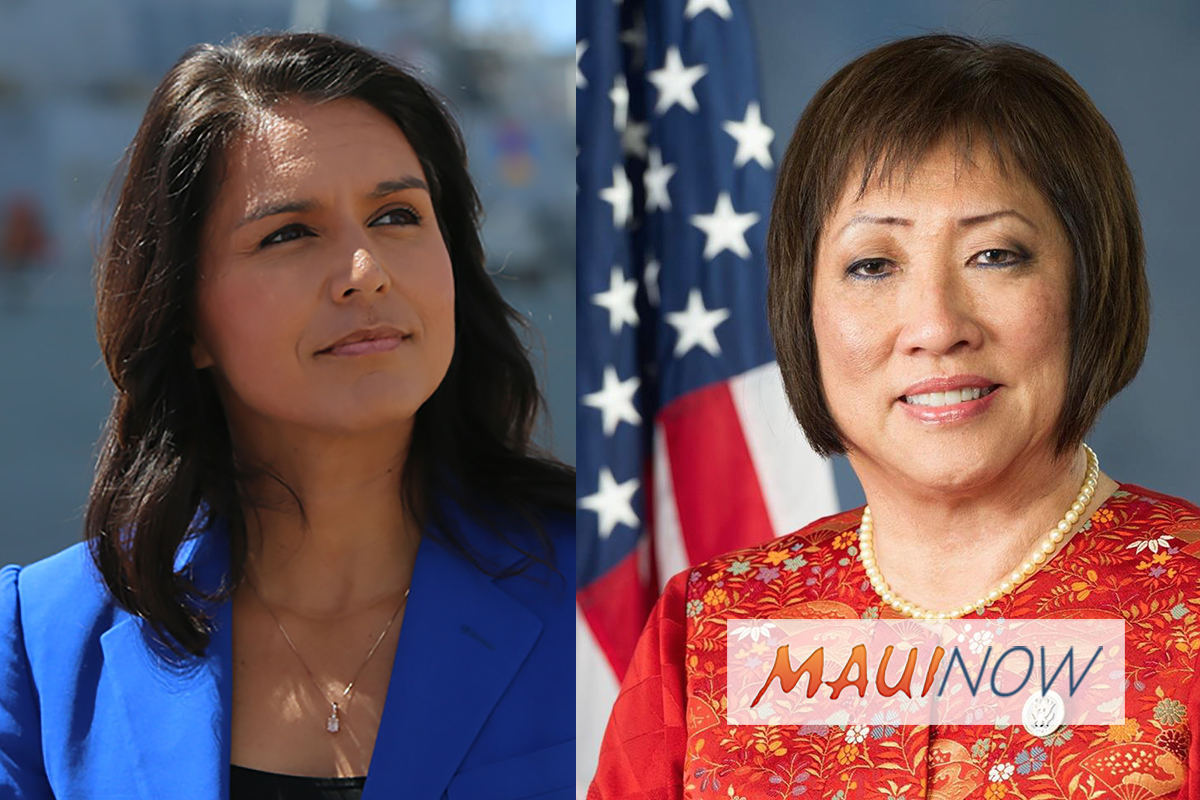Hawai‘i Congressional Team Urges Continued Diplomatic Talks on North Korea Denuclearization

US Rep. Tulsi Gabbard (left); and US Rep. Colleen Hanabusa (right). US House Office of Photography: Official photo.
Following President Trump and North Korean leader Kim Jong-Un’s agreement committing to the denuclearization of North Korea, Hawaiʻi’s Congressional leaders weighed in.
US Rep. Tulsi Gabbard (HI-02) urged continued diplomatic negotiations to peacefully secure denuclearization.
“We must ensure that in the wake of this historic summit, the diplomatic path continues to achieve complete, verifiable, irreversible denuclearization of North Korea. This is not about blind trust. This is not about points on a political scoreboard. There are lives at stake. In the interest of peace and humanity, we should all be rallying around our country’s success in continuing direct talks to remove the North Korea nuclear threat.”
Fellow US Congresswoman Colleen Hanabusa said that for Hawaiʻi, the agreement should assuage fears of a possible nuclear attack from North Korea. She said her hope is that the meeting is not the end, but rather “the beginning of a means to the end.”
Both suggested that the details of the agreement are critical in defining the way forward.
In a speech on the House floor, Congresswoman Tulsi Gabbard said:
“Just six months ago, my constituents and people all across Hawai‘i received a harrowing alert on their cell phones that a ballistic missile was incoming and to take cover immediately. It turned out to be false alarm but the terror that my family, friends, and people all across the State of Hawai‘i experienced was very real, shining a light on the stark reality and the seriousness of the North Korea nuclear threat that hangs over them and this country.
“The agreement that came from the U.S.-North Korea summit that just concluded late last night committing North Korea to complete denuclearization is a first step but there is far more work to be done. We must be vigilant to make sure that the details of this deal ensure complete, verifiable, and irreversible denuclearization of North Korea. You hear talking heads on TV talking about who put up more points on the scoreboard—missing the seriousness and the actual point of what we’re dealing with. This is not a game. There are lives at stake. In the interest of peace and humanity, we should all be rallying around our country’s success in continuing to pursue diplomacy and peace to remove this threat and denuclearize North Korea.”
In a released statement Congresswoman Hanabusa said:
“For Hawaiʻi, this should assuage fears of a possible nuclear attack from North Korea. My belief has always been that our greatest nuclear adversary remains Russia. There is no doubt that this is a historic moment in the relationship between the countries and the region. The two leaders agreed “to build a lasting and stable peace regime on the Korean peninsula” and “the DPRK commits to work toward complete denuclearization of the Korean peninsula.” They put that in writing.
“My hope is that this meeting is not the end, rather the beginning of a means to the end. We must remember the two individuals leading these negotiations. They both have a history of backing out of big deals and making false promises. It will take significant negotiations and diplomatic maneuvering to define the details of this vague agreement. How will we enforce it? It is also concerning that there was almost no mention of North Korea’s atrocious human rights records and whether it would be a condition required in any agreement.
“In March, I had the privilege of attending the Aspen Institute’s Congressional Program titled “Finding a Diplomatic Solution to the North Korea Crisis” at Stanford University. The conference featured three days of round table discussions with scholars, soldiers, and diplomats, including former US Ambassador to South Korea Christopher Hill and Sue Mi Terry, a former North Korea analyst for the CIA. Ambassador Hill attended the six-party talks that occurred intermittingly starting in 2003 between China, Japan, North Korea, Russia, South Korea, and the United States.
“All the experts in attendance, including the delegation from China, were unanimous in their belief that peace and diplomatic relations could not be restored if the leaders of United States and North Korea could not meet and speak. I was concerned the President was going to go there and sign a peace treaty and make a show of it. That would have put us in a precarious position because it would have paved the legal pathway for the removal of US troops from South Korea. Remember, we are technically not at peace with Korea, there is an armistice in place. The details of this agreement are critical to defining the way forward and only time will tell.”










